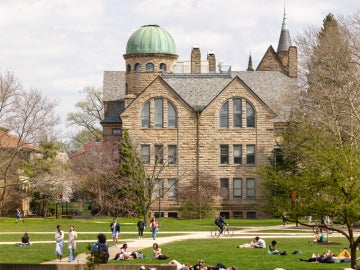Cold Cash for Study of Ultracold Atoms
May 29, 2013
Amanda Nagy

Jennifer Schloss
Photo credit: Jennifer Schloss
Jennifer Schloss ’11 is one of 15 graduate students in the United States selected for the Hertz Fellowship, considered to be the nation’s most generous support for graduate education in the applied physical, biological, and engineering sciences. The Hertz Fellowship is valued at more than $250,000 per student, with support lasting up to five years. Fellows have the freedom of innovation in their doctoral studies without most traditional research funding restrictions.
Schloss, who is studying atomic, molecular, and optical physics in the PhD program at Massachusetts Institute of Technology, also accepted a National Science Foundation (NSF) Graduate Research Fellowship in coordination with the Hertz award. This means the NSF will provide her tuition and stipend for three of the five years, but she will remain a Hertz fellow throughout her doctoral studies.
Hertz fellows pursue their own ideas with complete financial independence, under the guidance of some of the country’s finest professors and mentors. Fellows are chosen for their intellect, their ingenuity, and their potential to bring meaningful improvement to society. The highly competitive selection process includes a comprehensive written application, four references, and two rounds of technical interviews by recognized leaders in applied sciences and engineering.
At MIT, Schloss’ research involves studying the quantum physics of gases of “ultracold” atoms and molecules—just billionths of a degree above absolute zero temperature. This work may help physicists better understand superconductors and could lead to a new realization of quantum computers.
“The Hertz fellowship gives me tremendous freedom to study physics that interests me and to explore my creativity,” says Schloss, who is originally from Concord, Massachusetts. “The financial support is tied to me, not to any particular research group. As a result, I am able to craft my own education and develop a rich body of research while immune to typical funding restraints.”
In addition to funding from both fellowships, Schloss will benefit from a community of current and previous Hertz fellows. The program brings past and current fellows together in workshops and retreats to inspire one another and collaborate across generations and disciplines for innovation that further augments their powerful contribution. “Being a part of the Hertz community is invaluable,” she says.
At Oberlin, Schloss worked in the lab of Professor of Physics Stephen FitzGerald, who is in the midst of a three-year, $230,000 grant from the NSF to study the quantum dynamics of metal-organic frameworks. His work contributes to the ongoing effort to develop materials that can trap and store hydrogen—in a way that’s small, lightweight, and efficient—which is critical for the use of hydrogen fuel cells in automobiles.
Schloss says she owes a tremendous amount to Oberlin for giving her the preparation and support to become a Hertz fellow and a successful graduate student. “I benefited from Oberlin’s enriching culture and from the mentorship of professors across many departments. I’m particularly grateful for the physics and astronomy department for giving me opportunities that I would not have had at a large university. I was able to get involved in research early on and make significant contributions. Moreover, the department’s teaching excellence gave me a deep love and understanding of physics.”
Nearly half of this year’s fellows are women. “This is a significant part of a historic trend in the Hertz fellowship community,” says Jay Davis, president of the Hertz Foundation.
For 50 years, the Hertz Foundation has fostered the scientific and engineering strength of the nation by finding the best and brightest students from those disciplines. During the past decade of applications, there has been a major shift of the candidates toward those who apply physical and computational tools to the problems of biomedicine and health. Significantly, another shift of the Hertz Foundation has been to support Hertz fellows to build the vibrant Hertz fellows community.
You may also like…
Oberlin Launches Critical AI Studies Minor in Fall 2026
With a solid foundation in both science and the humanities, this minor ensures students to understand and be able to analyze the ethical, cultural, environmental, political, economic, technological, and labor effects of AI.
Chudi Martin Jr. ’24 Earns Prestigious Gates Cambridge Scholarship
Chudi Martin Jr. ’24 earns prestigious Gates Cambridge Scholarship.
Oberlin Named a Top Producer of Fulbright Students for 2025-26
Oberlin College and Conservatory was named a Top Producer of Fulbright students for the 2025-2026 academic year.


